中考复习完形填空的解题技巧课件(共100张PPT)
文档属性
| 名称 | 中考复习完形填空的解题技巧课件(共100张PPT) |  | |
| 格式 | pptx | ||
| 文件大小 | 763.8KB | ||
| 资源类型 | 教案 | ||
| 版本资源 | 通用版 | ||
| 科目 | 英语 | ||
| 更新时间 | 2022-10-18 17:12:35 | ||
图片预览



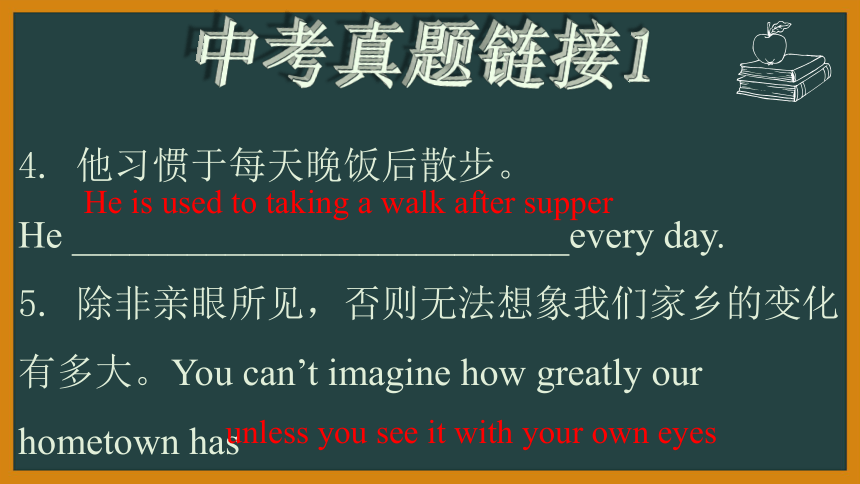
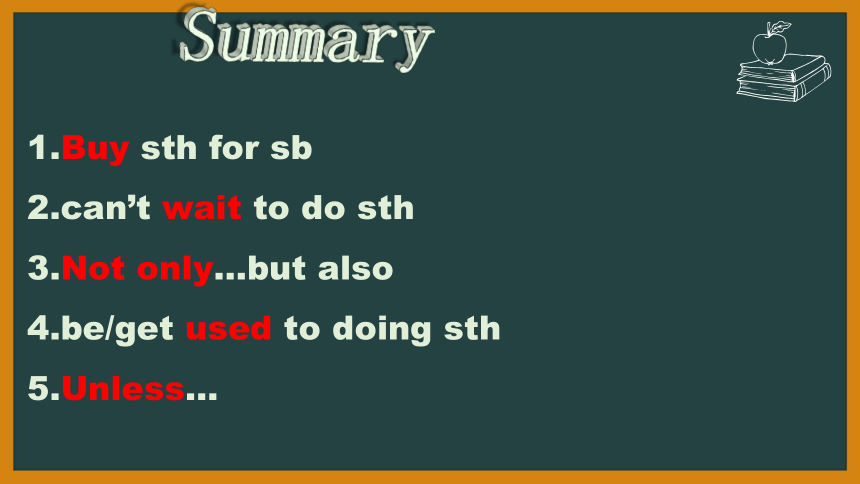

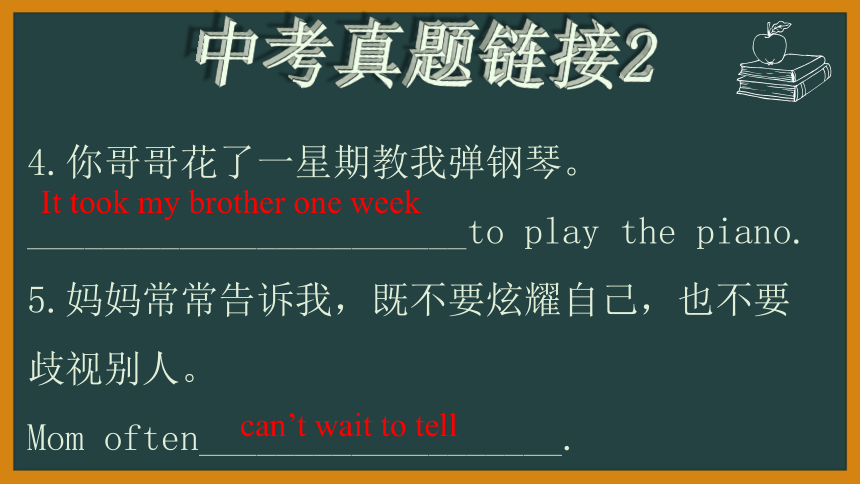
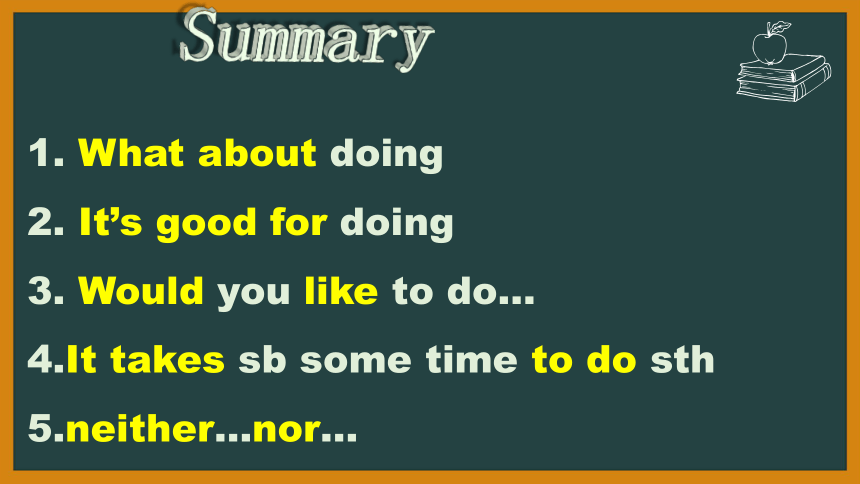

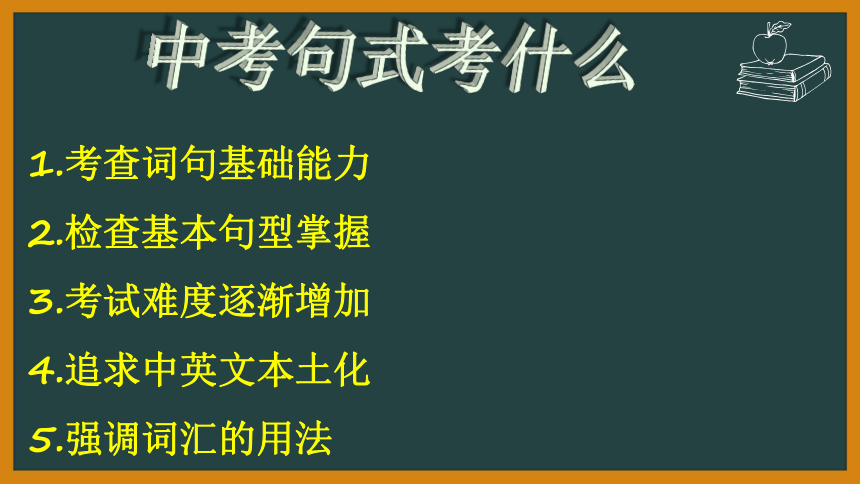
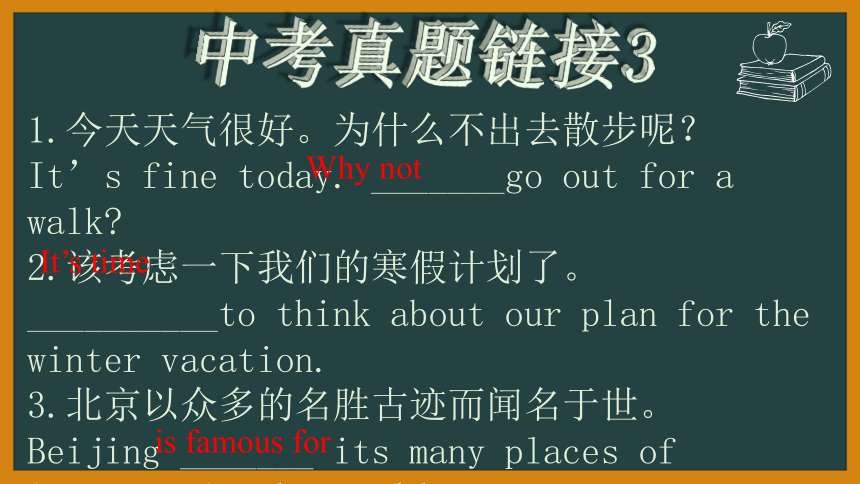
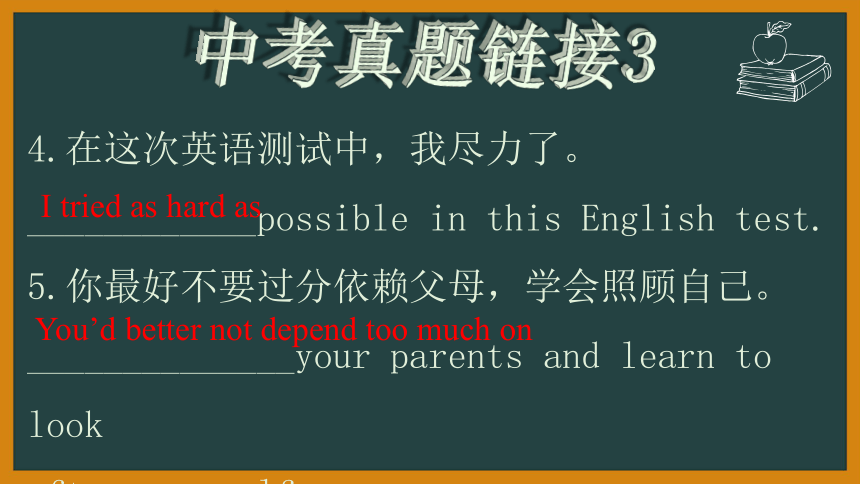
文档简介
(共100张PPT)
中
考
句
式
复
习
中考真题
中考真题链接1
1. 父亲节快到了,我想给父亲买些礼物。
Father’s Day is coming. I want to______________.
2. 她迫不及待地告诉她妈妈那个好消息。
She ________________ her mother the good news.
3. 李明不仅聪明而且勤奋。
Li Ming is_____________________________.
buy some gifts for him
can’t wait to tell
not only smart but also hard-working
中考真题链接1
4. 他习惯于每天晚饭后散步。
He __________________________every day.
5. 除非亲眼所见,否则无法想象我们家乡的变化有多大。You can’t imagine how greatly our hometown has changed__________________________.
He is used to taking a walk after supper
unless you see it with your own eyes
Summary
1.Buy sth for sb
2.can’t wait to do sth
3.Not only…but also
4.be/get used to doing sth
5.Unless…
中考真题链接2
1. 我喜欢北京的秋天,你呢?
I like the autumn in Beijing, _____ you
2. 多吃蔬菜水果对健康有好处。
_________your health to eat more vegetables and fruit.
3. 你愿意参观我们的新学校吗?
________________to visit our new school
what about
It’s good for
Would you like
中考真题链接2
4.你哥哥花了一星期教我弹钢琴。
_______________________to play the piano.
5.妈妈常常告诉我,既不要炫耀自己,也不要
歧视别人。
Mom often___________________.
It took my brother one week
can’t wait to tell
Summary
1. What about doing
2. It’s good for doing
3. Would you like to do…
4.It takes sb some time to do sth
5.neither…nor…
中考句式考什么?
中考句式考什么
1.考查词句基础能力
2.检查基本句型掌握
3.考试难度逐渐增加
4.追求中英文本土化
5.强调词汇的用法
中考真题链接3
1.今天天气很好。为什么不出去散步呢?
It’s fine today. _______go out for a walk
2.该考虑一下我们的寒假计划了。
__________to think about our plan for the
winter vacation.
3.北京以众多的名胜古迹而闻名于世。
Beijing _______ its many places of interest in the world.
Why not
It’s time
is famous for
中考真题链接3
4.在这次英语测试中,我尽力了。
____________possible in this English test.
5.你最好不要过分依赖父母,学会照顾自己。
______________your parents and learn to look
after yourself.
I tried as hard as
You’d better not depend too much on
Summary
1.Why not…
2.It’s time…
3.Be famous for
4. as…as possible
5.Had better not do sth
掌握常用句型
掌握常用句型
常考简单句型
次常考简单句型
常考单词、词组类句型
常考组合句型
掌握常用句型
常考简单句型
常考简单句型
1. as soon as
2. It’s time for…/ to do something
3. It’s two meters (years) … long (old)
4. be famous / late/ ready/ sorry for
常考简单句型
5.Had better (not)do
6.I don’t think that…
7.It’s bad/good for…
8.Let sb do
常考简单句型
9.What about/How about…
10.Why not…
11.There is something wrong with…
12.What’s wrong/the matter with…
13.Will(Would/Could)you please…
常考简单句型1
1.As soon as…
1.到家请回电话。
Please call back as soon as you arrive home.
2.他一到北京就来我们家。
He will come to my home as soon as he gets to Beijing.
常考简单句型1
1.As soon as…一。。。就。。。
1.引导:时间状语从句,
2.时态:遵循“主将从现“
3.主句:也可是祈使句或含有情态动词的句子。
常考简单句型2
2.It’s time for sb to do sth
1.到了你吃药的时间了。
It’s time for you to take some medicine.
2.到了上床睡觉的时候了。
It’s time for bed.
常考简单句型2
2.It’s time for sb to do sth
1.“到了做某事的时间、该做某事了”,
2.用名词表示事件,“It’s time for sth.”。
常考简单句型3
3. It’s two meters (years) … long (old)
1.我们的教室15米长,八米宽。
Our classroom is fifteen meters long and eight meters wide.
2.这位老人有80岁高龄了。
This man is eighty years old now.
常考简单句型3
3. It’s two meters (years) … long (old)
1.表示“某人或某物有多高/ 多长等”
2.基数词超过一,量词meter等要用复数
常考简单句型4
4. be famous / late/ ready/ sorry for
1.这个老年人因为他的书法而出名。
The old man is famous for his handwriting.
2.没能参加你的生日聚会我们感到抱歉。
We are sorry for not taking part in your birthday party.
常考简单句型4
4. be famous / late/ ready/ sorry for
“因为某人或某事而出名/
迟到/ 做好准备/ 道歉”,
2. 其中介词for表示原因。
常考简单句型5
5.Had better (not)do
1.我们最好步行去那里。
We had better go there on foot.
2.你最好不要再迟到了。
You’d better not be late for school again.
常考简单句型5
5.Had better (not)do
1.had better+动词原形,
2.略写为’d better,“最好做某事”,
3.否定:had better 后加not。
常考简单句型6
6.I don’t think that…
1.我认为他不对。
I don’t think he is right.
2.我们觉得没有她的帮助,我们不可能学好数学。
We don’t think we can learn math well without her help.
常考简单句型6
6.I don’t think that…
1. think, believe, imagine, suppose, expect, guess
2.主句主语是第一人称,而且主句是一般现在时
的时候,从句否定一般要转移到主句中。
常考简单句型7
7.It’s bad/good for…
1.蔬菜对你有好处,而吸烟对你有害。
Vegetables are good for you ,while smoking is bad for you.
2.做锻炼对你的健康有好处。
Doing sports is good for your health.
常考简单句型7
7.It’s bad/good for…
It is good / bad for…后面接名词或代词,
如果接动词,要用动名词形式,
表示“对……有益” 或“对……有害”。
常考简单句型8
8.Let sb do/make/have (not) do sth
1.我的爸爸每天使我在家做一个小时的家庭作业。
My father often makes me do my homework for an hour.
2.每天他被迫工作十多个小时。
He was made to work for more than ten hours.
常考简单句型8
8.Let sb do/make/have (not) do sth
1.使役动词make/ let/ have+省略to动词不定式作宾语
2.意思是“使/ 让某人做某事”
3.变成被动语态时,要把省略的to加上。.
常考简单句型9
9.What about/How about…
1.放学后去游泳怎么样?
What about swimming after school
2.我想要去游泳,你呢?
I’d like to swim. How about you
常考简单句型9
9.What about/How about…
1.询问“做某事怎么样/ 如何”,
2.用来征求别人的意见.
3.介词about后要接名词、代词或动名词作宾语
常考简单句型10
10.Why not…/Why don’t you…
1.为什么不和我一起去呢?
Why not go with me
=Why don’t you go with me
常考简单句型10
10.Why not…/Why don’t you…
1.表示 “向别人提出建议或征求意见”。
2.Why not后可以直接加动词原形,
可以看成是Why don’t you do ... 的省略形式,
常考简单句型11
11.There is something wrong with…
1.我的电脑出毛病了。
There is something wrong with my computer.
2.我的自行车没有毛病。
There is nothing wrong with my bike.
常考简单句型11
11.There is something wrong with…
1.表示“某物或某人出毛病了”。
2.疑问句:Is there anything wrong with sth./sb.
否定句:There isn’t anything wrong with sth./sb.或There is nothing wrong with sth./sb.
常考简单句型12
12.What’s wrong/the matter with…
1.你的腿怎么啦?没有什么大毛病。
What’s wrong with you leg Nothing serious.
询问某人或者某物出什么毛病了。
2.What’s wrong with+接人接物作宾语,
3.同义句型是What’s the matter with...
常考简单句型13
13.Will(Would/Could)you please…
1.请你为我打开门好吗?
Would you please open the door for me
2.请你把球传过来好吗?
Would you please pass me the ball
常考简单句型13
13.Will(Would/Could)you please…
1.表示“请求别人做某事”,
2.would和could没有过去的意义,
只是使语气更委婉,其中please可省略。
掌握常用句型
次常考简单句型
次常考简单句型
1.I would like to…/Would you like to…
2.One…the other…/Some…others…
3.Be glad that…
4.both…and…
5.neither…nor… 6.not…at all
次常考简单句型1
1.I would like to…/Would you like to…
1.你愿意让我帮你的儿子吗?
Would you like me to help your son
2.放学后你愿意和我一起去游泳吗?
Would you like to gi swimming with me
次常考简单句型1
1.I would like to…/Would you like to…
1.表示“你想要/愿意(某人)做某事吗”,2.would like用动词不定式,用来征求意见。
次常考简单句型2
2.One…the other…/Some…others…
1.他有两个女儿,一个是护士,另一个是工人。
He has two daughters. One is a nurse , the other is a worker.
2.一些人同意他们的观点,其他人都反对。
Some agree with them, while the others disagree.
次常考简单句型2
2.One…the other…/Some…others…
One…the other…表示“两个人或物中的一个和另一个”,此时的other作代词
Some…others一些另一些
次常考简单句型3
3.Be glad/happy/pleased that…
1.对于每个学生都尽可能努力学习,我很欣慰。
I am glad that every student is studying as hard as possible.
2.对于你通过了考试,我很高兴。
I’m glad that you passed the exam.
次常考简单句型3
3.Be glad/happy/pleased that…
1.表示“对于某事很高兴”,
2.that 后跟一个句子,这里的that可以省掉。
3.类似的用法还有be happy/pleased that+从句。
次常考简单句型4
4.both…and…
1.我们既学英语又学汉语。
We learn both English and Chinese.
2.老师们和学生们都被这个故事所感动。
Both teachers and students were touched by the story.
次常考简单句型4
4.both…and…
1. both…and…表示“两者都……”,
2.并列连接对等的成分。
3.连接两个并列主语时,谓语动词用复数形式,表示两者都做某事。
次常考简单句型5
5.neither…nor…
1.我和他都没去过美国。
Neither I nor he has been to the U.S.
2.昆明的天气既不太冷,也不太热。
The weather in Kunming is neither too hot nor too cold.
次常考简单句型5
5.neither…nor…
1. both… and…的否定形式,
2.neither... nor...连接两个主语时,谓语动词一般就近一致,即谓语动词的单复数要和最近的主语保持一致,表示“两者都不做某事”。
次常考简单句型6
6.not…at all
1.我们在课下根本不讲英语。
We don’t speak English at all after class.
2.尽管她犯了很多的错误,她一点都不惭愧。
Though she made many mistakes, she doesn’t feel sorry at all.
次常考简单句型6
6.not…at all
1.not…at all 表示“一点也不……”,常用在否定句中,加强语气。not要与be动词或助动词连用。
1)用于回答感谢,意为“不用谢;不客气”。
2)用于回答带有感谢性质的客套话,意为“没什么”
3)用于回答道歉,意为“没关系”。
4) 用来表示否定(是No的加强说法),意为“一点也不,完全不”。
掌握常用句型
常考单词、词组类句型
常考单词类句型
1. be busy doing sth.
2. enjoy/ hate / finish/mind/keep/go on doing sth
3. get on with
4. get ready for /get sth ready
常考单词类句型
5.Help sb(to)do/with sth
6.make/let sb(not) do sth
7.Spend…on…/doing
8.Stop sb from doing sth
9.see/hear sb do/doing
常考单词类句型
10.Ask sb to do 11.Used to…
12.bring/take sb sth 13.keep/make sth adj.
14.stop doing/to do 15.get+比较级
16.Be afraid of/to do
常考单词类句型1
1.Be busy doing sth
1.我们的老师正忙于批改我们的作业。
Our teacher is busy correcting our homework.
Our teacher is busy with our homework.
常考单词类句型1
1.Be busy doing sth
表示“ ”,
be busy+动名词,接名词
或者代词时用 。
某人忙于做某事
be busy with…
常考单词类句型2
2. enjoy/ hate / finish/mind/keep/go on doing sth
1.你介意我在这里抽烟吗?
Do you mind my smoking here
2.你需要练习写作。
You need to practice writing.
常考单词类句型3
3. get on with
1.我和我的同学们相处得很好。
I get on well with my classmates.
2. 你的英语学得怎样?
How are you get on/along with your English
常考单词类句型3
3. get on with
该句式表示“和某人相处的融洽”,
同义词组有get along well with sb。
另外,get along也有进展、进行的意思。
常考单词类句型4
4. get ready for /get sth ready
1.下一站是天安门东,请准备下车。
The next stop is Tian’anmen East. Please get ready for your arrival.
2.快回家吧,妈妈已经把饭准备好了!
Go home immediately. Mum has got the dinner ready.
常考单词类句型4
4. get ready for /get sth ready
get ready for / get sth. ready
表示“为……做好准备”,把……准备好
For为了,后面接名词、代词或动词-ing形式。
常考单词类句型5
5.Help sb(to)do/with sth
1我经常帮助妈妈做家务。
I often help my mum do the housework.
2.他在数学方面给我很大的帮助。
He helped me a lot with math.
常考单词类句型5
5.Help sb(to)do/with sth
这两个句式都表示“帮助某人做某事”。
后接动词不定式时,do或to do都可以;
如果是后接名词或代词时,要用with。
常考单词类句型6
6.make/let sb(not) do sth
1.我的爸爸每天使我在家做一个小时的家庭作业。
My father often makes me do my homework for an hour at home.
2.每天他被迫工作十多个小时。
He was made to work more than ten hours a day.
常考单词类句型6
6.make/let sb(not) do sth
1.使役动词make/ let/ have+省略to的动词
不定式作宾语补足语,
2.意思是“使/ 让某人做某事”而此句型谓语动词变成被动语态时,要把省略的to加上。
常考单词类句型7
7.Spend…on…/doing
1.昨天晚上我花了两个小时做作业。
2.他把大部分钱都花在周游全国了。
I spent two hours on my homework last night.
He spends most of his money in traveling around the country.
常考单词类句型7
7.Spend…on…/doing
1.昨天晚上我花了两个小时做作业。
2.他把大部分钱都花在周游全国了。
I spent two hours on my homework last night.
He spends most of his money in traveling around the country.
常考单词类句型7
7.Spend…on…/doing
花费时间、金钱在某物或者做某事
It takes sb some time to do
Pay for
Cost sb money
常考单词类句型8
8.Stop sb from doing sth
1.现在上课了,你们应该停止谈话。
2.我们已经工作三个小时了。让我们停下来休息一会吧。
It’s time for class. You should stop talking.
We have worked for three hours. Let’s stop to have a rest.
常考单词类句型8
8.Stop sb from doing sth
动词stop+接动名词,+动词不定式,区别如下:stop doing sth.“停止做某事(即停止正在做的事)”,
stop to do sth.表示“停下来(手头事)开始做另一事”。
Stop from…/stopped/n.停靠站bus ~
常考单词类句型9
9.see/hear sb do/doing
当我离开你家的时候看到你的父亲正在看电视。
我们看见他穿上大衣出去了。
We saw him put on his coat and go out.
I saw your father watching TV when I left your home.
常考单词类句型9
9.see/hear sb do/doing
表示“某人听/看到某人做某事”,
用动词原形作宾补时,表示听或看到某人做某事全过程;
用现在分词作宾补时,表示听或看到某人正在做某事。
常考单词类句型10
10.Ask sb to do
1.我们的老师经常告诉我们在家做我们的家庭作业。
Our teacher often tells us to do our homework at home.
他要我帮他擦车。
-He asked me to help him clean his car.
常考单词类句型10
10.Ask sb to do
动词ask、tell、want的后面可以用动词不定式作宾语补足语,意思“要求/ 告诉/ 想要某人做某事”。
常考单词类句型11
11.Used to…
我的爸爸过去曾经是一名数学老师。
以前都是你自己一个人做的吗?
My father used to be a math teacher.
You used to do this by yourself
常考单词类句型11
11.Used to…
这个句型在used to的后面要用动词原形,其中to是不定式符号,表示“过去常常做某事”,现在已经不做了。
Be used to do/ doing…
常考单词类句型12
12.bring/take sb sth
昨天我妈妈给我买了一件新毛衣。
My mother bought me a new sweater yesterday.
=My mother bought a new sweater for me yesterday.
常考单词类句型12
12.bring/take sb sth
give/ buy/ lend等动词后可以跟双宾语,
“给某人某物/ 给某人买某物/ 借给某人某物”,表某物是直接宾语,表某人是间接宾语。如果直接宾语在前面,间接宾语在后面要用介词to/for。
与to连用的有:give,lend,bring,hand,pass,read,return,sell,
常见的能与for连用的有:buy,choose,cook,find,get,make,order,prepare
常考单词类句型13
13.keep/make sth adj.
对不起,让你久等了。
I am sorry for keeping you waiting for a long time.
请保持门开着。
Keep the door open, please.
常考单词类句型13
13.keep/make sth adj.
keep sb doing sth表示“让别人一直做某事”,而keep doing 表示“某人一直做某事”。
keep 还可以加形容词,表示保持某物的状态,即keep sth. + 形容词(adj.)。
常考单词类句型14
14.stop doing/to do
现在上课了,你们应该停止谈话。
It’s time for class. You should stop talking.
我们已经工作三个小时了。让我们停下来休息一会吧。
We have worked for three hours. Let’s stop to have a rest.
常考单词类句型14
14.stop doing/to do
动词stop的后面可以接动名词,也可以接动词不定式,区别如下:stop doing sth.表示“停止做某事(即停止正在做的事)”, stop to do sth.表示“停下来(手头的事)开始做另一事”。
常考单词类句型15
15.get+比较级/ prefer +宾语A+to +宾语B
我爸爸喜欢苹果胜过香蕉
My father prefers apples to bananas.
他是个喜欢做而不喜欢说的人。
He is a man who prefers doing to talking.
常考单词类句型16
16. Be afraid of/to do
1.我的小妹妹害怕狗。 _____________________
2.他担心出错。 _____________________
3.我恐怕不能帮助你。 _____________________
My little sister is afraid of dogs.
He is afraid of making mistakes.
I am afraid I can’t help you.
常考单词类句型
16.
1)be afraid of+名词或动名词,
表示“ ”, 也可以用 .。
2)be afraid +that对方不愿意听到的,
多译成“ ”
某人害怕某事
be afraid to do sth
恐怕
掌握常用句型
常考组合句型
常考组合句型
1. It’s important for somebody to do something
2. (not) as/so…as…
3. as … as possible
4. either…or…
常考组合句型
5.Not only…but also
6.It takes sb some time to do
7.not…until 8.too…to…
9.so…that…
10.the+比较级,the+比较级
掌握常用句型
易错句型
易错句型
1.as…as possible
2.Not only…but also…
3.spend…doing…
易错句型1
我们应该尽可能多花点时间去户外运动一下,
因为这样不仅对我们的健康有好处,还能使我们更亲近自然。
We should spend as much time doing
outdoor activities as possible, because it not
only good to our health, but also makes us
closer to nature.
做题技巧点拨
找出缺失汉语
写出对应英语
结合常考句型
检查时态、单复数和拼写
中
考
句
式
复
习
中考真题
中考真题链接1
1. 父亲节快到了,我想给父亲买些礼物。
Father’s Day is coming. I want to______________.
2. 她迫不及待地告诉她妈妈那个好消息。
She ________________ her mother the good news.
3. 李明不仅聪明而且勤奋。
Li Ming is_____________________________.
buy some gifts for him
can’t wait to tell
not only smart but also hard-working
中考真题链接1
4. 他习惯于每天晚饭后散步。
He __________________________every day.
5. 除非亲眼所见,否则无法想象我们家乡的变化有多大。You can’t imagine how greatly our hometown has changed__________________________.
He is used to taking a walk after supper
unless you see it with your own eyes
Summary
1.Buy sth for sb
2.can’t wait to do sth
3.Not only…but also
4.be/get used to doing sth
5.Unless…
中考真题链接2
1. 我喜欢北京的秋天,你呢?
I like the autumn in Beijing, _____ you
2. 多吃蔬菜水果对健康有好处。
_________your health to eat more vegetables and fruit.
3. 你愿意参观我们的新学校吗?
________________to visit our new school
what about
It’s good for
Would you like
中考真题链接2
4.你哥哥花了一星期教我弹钢琴。
_______________________to play the piano.
5.妈妈常常告诉我,既不要炫耀自己,也不要
歧视别人。
Mom often___________________.
It took my brother one week
can’t wait to tell
Summary
1. What about doing
2. It’s good for doing
3. Would you like to do…
4.It takes sb some time to do sth
5.neither…nor…
中考句式考什么?
中考句式考什么
1.考查词句基础能力
2.检查基本句型掌握
3.考试难度逐渐增加
4.追求中英文本土化
5.强调词汇的用法
中考真题链接3
1.今天天气很好。为什么不出去散步呢?
It’s fine today. _______go out for a walk
2.该考虑一下我们的寒假计划了。
__________to think about our plan for the
winter vacation.
3.北京以众多的名胜古迹而闻名于世。
Beijing _______ its many places of interest in the world.
Why not
It’s time
is famous for
中考真题链接3
4.在这次英语测试中,我尽力了。
____________possible in this English test.
5.你最好不要过分依赖父母,学会照顾自己。
______________your parents and learn to look
after yourself.
I tried as hard as
You’d better not depend too much on
Summary
1.Why not…
2.It’s time…
3.Be famous for
4. as…as possible
5.Had better not do sth
掌握常用句型
掌握常用句型
常考简单句型
次常考简单句型
常考单词、词组类句型
常考组合句型
掌握常用句型
常考简单句型
常考简单句型
1. as soon as
2. It’s time for…/ to do something
3. It’s two meters (years) … long (old)
4. be famous / late/ ready/ sorry for
常考简单句型
5.Had better (not)do
6.I don’t think that…
7.It’s bad/good for…
8.Let sb do
常考简单句型
9.What about/How about…
10.Why not…
11.There is something wrong with…
12.What’s wrong/the matter with…
13.Will(Would/Could)you please…
常考简单句型1
1.As soon as…
1.到家请回电话。
Please call back as soon as you arrive home.
2.他一到北京就来我们家。
He will come to my home as soon as he gets to Beijing.
常考简单句型1
1.As soon as…一。。。就。。。
1.引导:时间状语从句,
2.时态:遵循“主将从现“
3.主句:也可是祈使句或含有情态动词的句子。
常考简单句型2
2.It’s time for sb to do sth
1.到了你吃药的时间了。
It’s time for you to take some medicine.
2.到了上床睡觉的时候了。
It’s time for bed.
常考简单句型2
2.It’s time for sb to do sth
1.“到了做某事的时间、该做某事了”,
2.用名词表示事件,“It’s time for sth.”。
常考简单句型3
3. It’s two meters (years) … long (old)
1.我们的教室15米长,八米宽。
Our classroom is fifteen meters long and eight meters wide.
2.这位老人有80岁高龄了。
This man is eighty years old now.
常考简单句型3
3. It’s two meters (years) … long (old)
1.表示“某人或某物有多高/ 多长等”
2.基数词超过一,量词meter等要用复数
常考简单句型4
4. be famous / late/ ready/ sorry for
1.这个老年人因为他的书法而出名。
The old man is famous for his handwriting.
2.没能参加你的生日聚会我们感到抱歉。
We are sorry for not taking part in your birthday party.
常考简单句型4
4. be famous / late/ ready/ sorry for
“因为某人或某事而出名/
迟到/ 做好准备/ 道歉”,
2. 其中介词for表示原因。
常考简单句型5
5.Had better (not)do
1.我们最好步行去那里。
We had better go there on foot.
2.你最好不要再迟到了。
You’d better not be late for school again.
常考简单句型5
5.Had better (not)do
1.had better+动词原形,
2.略写为’d better,“最好做某事”,
3.否定:had better 后加not。
常考简单句型6
6.I don’t think that…
1.我认为他不对。
I don’t think he is right.
2.我们觉得没有她的帮助,我们不可能学好数学。
We don’t think we can learn math well without her help.
常考简单句型6
6.I don’t think that…
1. think, believe, imagine, suppose, expect, guess
2.主句主语是第一人称,而且主句是一般现在时
的时候,从句否定一般要转移到主句中。
常考简单句型7
7.It’s bad/good for…
1.蔬菜对你有好处,而吸烟对你有害。
Vegetables are good for you ,while smoking is bad for you.
2.做锻炼对你的健康有好处。
Doing sports is good for your health.
常考简单句型7
7.It’s bad/good for…
It is good / bad for…后面接名词或代词,
如果接动词,要用动名词形式,
表示“对……有益” 或“对……有害”。
常考简单句型8
8.Let sb do/make/have (not) do sth
1.我的爸爸每天使我在家做一个小时的家庭作业。
My father often makes me do my homework for an hour.
2.每天他被迫工作十多个小时。
He was made to work for more than ten hours.
常考简单句型8
8.Let sb do/make/have (not) do sth
1.使役动词make/ let/ have+省略to动词不定式作宾语
2.意思是“使/ 让某人做某事”
3.变成被动语态时,要把省略的to加上。.
常考简单句型9
9.What about/How about…
1.放学后去游泳怎么样?
What about swimming after school
2.我想要去游泳,你呢?
I’d like to swim. How about you
常考简单句型9
9.What about/How about…
1.询问“做某事怎么样/ 如何”,
2.用来征求别人的意见.
3.介词about后要接名词、代词或动名词作宾语
常考简单句型10
10.Why not…/Why don’t you…
1.为什么不和我一起去呢?
Why not go with me
=Why don’t you go with me
常考简单句型10
10.Why not…/Why don’t you…
1.表示 “向别人提出建议或征求意见”。
2.Why not后可以直接加动词原形,
可以看成是Why don’t you do ... 的省略形式,
常考简单句型11
11.There is something wrong with…
1.我的电脑出毛病了。
There is something wrong with my computer.
2.我的自行车没有毛病。
There is nothing wrong with my bike.
常考简单句型11
11.There is something wrong with…
1.表示“某物或某人出毛病了”。
2.疑问句:Is there anything wrong with sth./sb.
否定句:There isn’t anything wrong with sth./sb.或There is nothing wrong with sth./sb.
常考简单句型12
12.What’s wrong/the matter with…
1.你的腿怎么啦?没有什么大毛病。
What’s wrong with you leg Nothing serious.
询问某人或者某物出什么毛病了。
2.What’s wrong with+接人接物作宾语,
3.同义句型是What’s the matter with...
常考简单句型13
13.Will(Would/Could)you please…
1.请你为我打开门好吗?
Would you please open the door for me
2.请你把球传过来好吗?
Would you please pass me the ball
常考简单句型13
13.Will(Would/Could)you please…
1.表示“请求别人做某事”,
2.would和could没有过去的意义,
只是使语气更委婉,其中please可省略。
掌握常用句型
次常考简单句型
次常考简单句型
1.I would like to…/Would you like to…
2.One…the other…/Some…others…
3.Be glad that…
4.both…and…
5.neither…nor… 6.not…at all
次常考简单句型1
1.I would like to…/Would you like to…
1.你愿意让我帮你的儿子吗?
Would you like me to help your son
2.放学后你愿意和我一起去游泳吗?
Would you like to gi swimming with me
次常考简单句型1
1.I would like to…/Would you like to…
1.表示“你想要/愿意(某人)做某事吗”,2.would like用动词不定式,用来征求意见。
次常考简单句型2
2.One…the other…/Some…others…
1.他有两个女儿,一个是护士,另一个是工人。
He has two daughters. One is a nurse , the other is a worker.
2.一些人同意他们的观点,其他人都反对。
Some agree with them, while the others disagree.
次常考简单句型2
2.One…the other…/Some…others…
One…the other…表示“两个人或物中的一个和另一个”,此时的other作代词
Some…others一些另一些
次常考简单句型3
3.Be glad/happy/pleased that…
1.对于每个学生都尽可能努力学习,我很欣慰。
I am glad that every student is studying as hard as possible.
2.对于你通过了考试,我很高兴。
I’m glad that you passed the exam.
次常考简单句型3
3.Be glad/happy/pleased that…
1.表示“对于某事很高兴”,
2.that 后跟一个句子,这里的that可以省掉。
3.类似的用法还有be happy/pleased that+从句。
次常考简单句型4
4.both…and…
1.我们既学英语又学汉语。
We learn both English and Chinese.
2.老师们和学生们都被这个故事所感动。
Both teachers and students were touched by the story.
次常考简单句型4
4.both…and…
1. both…and…表示“两者都……”,
2.并列连接对等的成分。
3.连接两个并列主语时,谓语动词用复数形式,表示两者都做某事。
次常考简单句型5
5.neither…nor…
1.我和他都没去过美国。
Neither I nor he has been to the U.S.
2.昆明的天气既不太冷,也不太热。
The weather in Kunming is neither too hot nor too cold.
次常考简单句型5
5.neither…nor…
1. both… and…的否定形式,
2.neither... nor...连接两个主语时,谓语动词一般就近一致,即谓语动词的单复数要和最近的主语保持一致,表示“两者都不做某事”。
次常考简单句型6
6.not…at all
1.我们在课下根本不讲英语。
We don’t speak English at all after class.
2.尽管她犯了很多的错误,她一点都不惭愧。
Though she made many mistakes, she doesn’t feel sorry at all.
次常考简单句型6
6.not…at all
1.not…at all 表示“一点也不……”,常用在否定句中,加强语气。not要与be动词或助动词连用。
1)用于回答感谢,意为“不用谢;不客气”。
2)用于回答带有感谢性质的客套话,意为“没什么”
3)用于回答道歉,意为“没关系”。
4) 用来表示否定(是No的加强说法),意为“一点也不,完全不”。
掌握常用句型
常考单词、词组类句型
常考单词类句型
1. be busy doing sth.
2. enjoy/ hate / finish/mind/keep/go on doing sth
3. get on with
4. get ready for /get sth ready
常考单词类句型
5.Help sb(to)do/with sth
6.make/let sb(not) do sth
7.Spend…on…/doing
8.Stop sb from doing sth
9.see/hear sb do/doing
常考单词类句型
10.Ask sb to do 11.Used to…
12.bring/take sb sth 13.keep/make sth adj.
14.stop doing/to do 15.get+比较级
16.Be afraid of/to do
常考单词类句型1
1.Be busy doing sth
1.我们的老师正忙于批改我们的作业。
Our teacher is busy correcting our homework.
Our teacher is busy with our homework.
常考单词类句型1
1.Be busy doing sth
表示“ ”,
be busy+动名词,接名词
或者代词时用 。
某人忙于做某事
be busy with…
常考单词类句型2
2. enjoy/ hate / finish/mind/keep/go on doing sth
1.你介意我在这里抽烟吗?
Do you mind my smoking here
2.你需要练习写作。
You need to practice writing.
常考单词类句型3
3. get on with
1.我和我的同学们相处得很好。
I get on well with my classmates.
2. 你的英语学得怎样?
How are you get on/along with your English
常考单词类句型3
3. get on with
该句式表示“和某人相处的融洽”,
同义词组有get along well with sb。
另外,get along也有进展、进行的意思。
常考单词类句型4
4. get ready for /get sth ready
1.下一站是天安门东,请准备下车。
The next stop is Tian’anmen East. Please get ready for your arrival.
2.快回家吧,妈妈已经把饭准备好了!
Go home immediately. Mum has got the dinner ready.
常考单词类句型4
4. get ready for /get sth ready
get ready for / get sth. ready
表示“为……做好准备”,把……准备好
For为了,后面接名词、代词或动词-ing形式。
常考单词类句型5
5.Help sb(to)do/with sth
1我经常帮助妈妈做家务。
I often help my mum do the housework.
2.他在数学方面给我很大的帮助。
He helped me a lot with math.
常考单词类句型5
5.Help sb(to)do/with sth
这两个句式都表示“帮助某人做某事”。
后接动词不定式时,do或to do都可以;
如果是后接名词或代词时,要用with。
常考单词类句型6
6.make/let sb(not) do sth
1.我的爸爸每天使我在家做一个小时的家庭作业。
My father often makes me do my homework for an hour at home.
2.每天他被迫工作十多个小时。
He was made to work more than ten hours a day.
常考单词类句型6
6.make/let sb(not) do sth
1.使役动词make/ let/ have+省略to的动词
不定式作宾语补足语,
2.意思是“使/ 让某人做某事”而此句型谓语动词变成被动语态时,要把省略的to加上。
常考单词类句型7
7.Spend…on…/doing
1.昨天晚上我花了两个小时做作业。
2.他把大部分钱都花在周游全国了。
I spent two hours on my homework last night.
He spends most of his money in traveling around the country.
常考单词类句型7
7.Spend…on…/doing
1.昨天晚上我花了两个小时做作业。
2.他把大部分钱都花在周游全国了。
I spent two hours on my homework last night.
He spends most of his money in traveling around the country.
常考单词类句型7
7.Spend…on…/doing
花费时间、金钱在某物或者做某事
It takes sb some time to do
Pay for
Cost sb money
常考单词类句型8
8.Stop sb from doing sth
1.现在上课了,你们应该停止谈话。
2.我们已经工作三个小时了。让我们停下来休息一会吧。
It’s time for class. You should stop talking.
We have worked for three hours. Let’s stop to have a rest.
常考单词类句型8
8.Stop sb from doing sth
动词stop+接动名词,+动词不定式,区别如下:stop doing sth.“停止做某事(即停止正在做的事)”,
stop to do sth.表示“停下来(手头事)开始做另一事”。
Stop from…/stopped/n.停靠站bus ~
常考单词类句型9
9.see/hear sb do/doing
当我离开你家的时候看到你的父亲正在看电视。
我们看见他穿上大衣出去了。
We saw him put on his coat and go out.
I saw your father watching TV when I left your home.
常考单词类句型9
9.see/hear sb do/doing
表示“某人听/看到某人做某事”,
用动词原形作宾补时,表示听或看到某人做某事全过程;
用现在分词作宾补时,表示听或看到某人正在做某事。
常考单词类句型10
10.Ask sb to do
1.我们的老师经常告诉我们在家做我们的家庭作业。
Our teacher often tells us to do our homework at home.
他要我帮他擦车。
-He asked me to help him clean his car.
常考单词类句型10
10.Ask sb to do
动词ask、tell、want的后面可以用动词不定式作宾语补足语,意思“要求/ 告诉/ 想要某人做某事”。
常考单词类句型11
11.Used to…
我的爸爸过去曾经是一名数学老师。
以前都是你自己一个人做的吗?
My father used to be a math teacher.
You used to do this by yourself
常考单词类句型11
11.Used to…
这个句型在used to的后面要用动词原形,其中to是不定式符号,表示“过去常常做某事”,现在已经不做了。
Be used to do/ doing…
常考单词类句型12
12.bring/take sb sth
昨天我妈妈给我买了一件新毛衣。
My mother bought me a new sweater yesterday.
=My mother bought a new sweater for me yesterday.
常考单词类句型12
12.bring/take sb sth
give/ buy/ lend等动词后可以跟双宾语,
“给某人某物/ 给某人买某物/ 借给某人某物”,表某物是直接宾语,表某人是间接宾语。如果直接宾语在前面,间接宾语在后面要用介词to/for。
与to连用的有:give,lend,bring,hand,pass,read,return,sell,
常见的能与for连用的有:buy,choose,cook,find,get,make,order,prepare
常考单词类句型13
13.keep/make sth adj.
对不起,让你久等了。
I am sorry for keeping you waiting for a long time.
请保持门开着。
Keep the door open, please.
常考单词类句型13
13.keep/make sth adj.
keep sb doing sth表示“让别人一直做某事”,而keep doing 表示“某人一直做某事”。
keep 还可以加形容词,表示保持某物的状态,即keep sth. + 形容词(adj.)。
常考单词类句型14
14.stop doing/to do
现在上课了,你们应该停止谈话。
It’s time for class. You should stop talking.
我们已经工作三个小时了。让我们停下来休息一会吧。
We have worked for three hours. Let’s stop to have a rest.
常考单词类句型14
14.stop doing/to do
动词stop的后面可以接动名词,也可以接动词不定式,区别如下:stop doing sth.表示“停止做某事(即停止正在做的事)”, stop to do sth.表示“停下来(手头的事)开始做另一事”。
常考单词类句型15
15.get+比较级/ prefer +宾语A+to +宾语B
我爸爸喜欢苹果胜过香蕉
My father prefers apples to bananas.
他是个喜欢做而不喜欢说的人。
He is a man who prefers doing to talking.
常考单词类句型16
16. Be afraid of/to do
1.我的小妹妹害怕狗。 _____________________
2.他担心出错。 _____________________
3.我恐怕不能帮助你。 _____________________
My little sister is afraid of dogs.
He is afraid of making mistakes.
I am afraid I can’t help you.
常考单词类句型
16.
1)be afraid of+名词或动名词,
表示“ ”, 也可以用 .。
2)be afraid +that对方不愿意听到的,
多译成“ ”
某人害怕某事
be afraid to do sth
恐怕
掌握常用句型
常考组合句型
常考组合句型
1. It’s important for somebody to do something
2. (not) as/so…as…
3. as … as possible
4. either…or…
常考组合句型
5.Not only…but also
6.It takes sb some time to do
7.not…until 8.too…to…
9.so…that…
10.the+比较级,the+比较级
掌握常用句型
易错句型
易错句型
1.as…as possible
2.Not only…but also…
3.spend…doing…
易错句型1
我们应该尽可能多花点时间去户外运动一下,
因为这样不仅对我们的健康有好处,还能使我们更亲近自然。
We should spend as much time doing
outdoor activities as possible, because it not
only good to our health, but also makes us
closer to nature.
做题技巧点拨
找出缺失汉语
写出对应英语
结合常考句型
检查时态、单复数和拼写
同课章节目录
- 词法
- 名词
- 动词和动词短语
- 动词语态
- 动词时态
- 助动词和情态动词
- 非谓语动词
- 冠词
- 代词
- 数词和量词
- 形容词副词及其比较等级
- 介词和介词短语
- 连词和感叹词
- 构词法
- 相似、相近词比较
- 句法
- 陈述句
- 一般疑问句和否定疑问句
- 特殊疑问句及选择疑问句
- 反意疑问句
- 存在句(There be句型)
- 宾语从句
- 定语从句
- 状语从句
- 主谓一致问题
- 简单句
- 并列句
- 复合句
- 主谓一致
- 主、表语从句
- 名词性从句
- 直接引语和间接引语
- 虚拟语气
- 感叹句
- 强调句
- 倒装句
- 祈使句
- 句子的成分
- 句子的分类
- 题型专区
- 单项选择部分
- 易错题
- 完形填空
- 阅读理解
- 词汇练习
- 听说训练
- 句型转换
- 补全对话
- 短文改错
- 翻译
- 书面表达
- 任务型阅读
- 语法填空
- 其他资料
